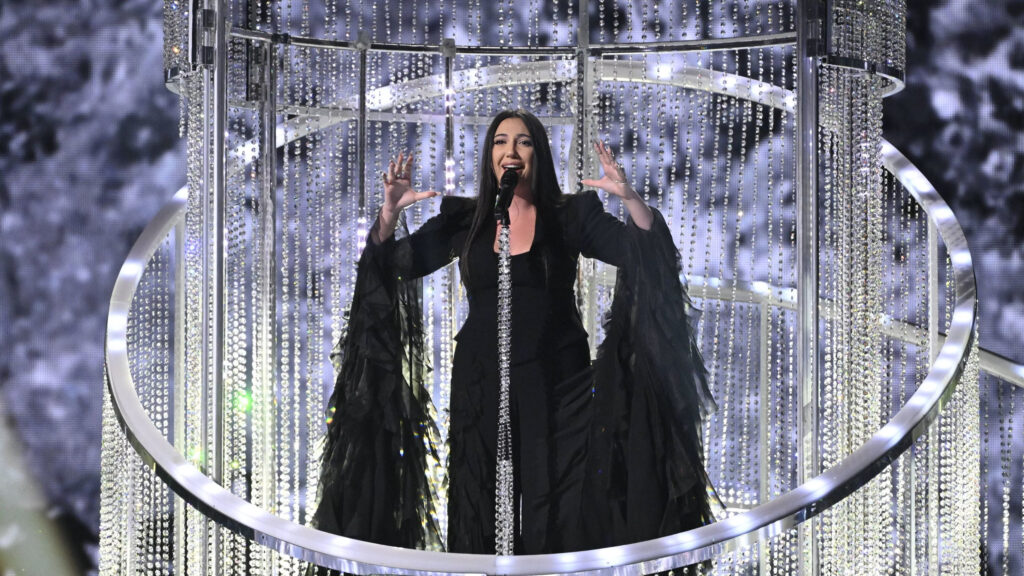Australia/Israel Review
Europa Europa: Singing amidst the ruins
May 28, 2025 | Alex Benjamin

“My former home… was a large house with many doors and many rooms for many different kinds of people. This house has been divided, broken up, ruined. I have no business with what is there now. I am used to living in a house, not in cabins.”
Early 20th century European novelist Joseph Roth hated divided societies, and was heartbroken over the shattering of Europe’s previous comity in the 1930s. Like contemporary European literary great Stefan Zweig, Roth spent his last years lamenting a shared European life destroyed by extremists. Both were Jews.
I was in Madrid last month, where, as Vice-Chair of the European Jewish Association, I found my thoughts drifting to the lamentations of Roth and Zwieg as we revealed the outcome of a poll we had taken across seven European countries.
More on the poll in a minute, but first let’s set the scene. Most Jews in Europe descend from ancestors who lived through the ‘break up’ of Roth’s European House – forced to migrate and take refuge in other countries, as doors were closed and everyone was forced into their separate “cabins”. For the vast majority of Jews who moved from Galicia or Romania or Ukraine to France or the UK, their primary preoccupation was leaving behind the past, building again, getting an education and playing an active role in society. So it was with my own family, who escaped pogroms in Bucharest and settled in London’s East End.
Jews seldom brought their old baggage with them. Never in my childhood did I hear my grandparents try to relitigate what happened to their families in Romania. Going out on the streets, harassing Romanians living in London, or calling for boycotts of Romanian goods would never have crossed their minds.
The poll we presented, conducted by IPSOS and analysed by an eminent European migration expert, saw 4,400 representative respondents in France, Germany, the United Kingdom, Spain, the Netherlands and Belgium express clearly that Europe is today importing antisemitism, long-standing conflicts and distorted narratives. These are then reshaped and echoed on the streets, in schools and across social networks.
Nowhere is this transmission more evident than among the continent’s youth. According to the poll’s data, 28% of Europeans aged 18 to 24 have either participated in or witnessed antisemitic remarks presented as anti-Israel commentary. The most common settings for antisemitic remarks? The workplace (48%) – followed by conversations among friends and family and then, public forums, both physical and digital.
Meanwhile, 65.4% of Europeans say that the war in the Middle East has impacted how Jews are viewed in their own countries. Among those, 55% say it has worsened perceptions. The conflict is not only reshaping views of Jews – 65.3% also say it affects how Palestinians are perceived, underscoring how foreign conflicts now create domestic powder kegs. This imported discourse is having real consequences: 20.4% of European respondents directly blamed the Jews in their own country for the Gaza war. In Spain, that figure climbs to 24%.
Media coverage also plays a decisive role in fuelling hate, with 49.3% of respondents saying they believe the media’s portrayal of the Israeli-Palestinian conflict has harmed Jewish communities in Europe. This view climbs to 62.6% in the Netherlands and 52.3% in Germany. Even when antisemitic incidents stem from foreign narratives, it is local Jewish communities who face a backlash – in fortress-like synagogues and Jewish buildings, in classrooms and on the streets.
The picture painted by the data is clear: geopolitical tensions are being absorbed into Europe’s social fabric, and Jewish communities are the first to bear the consequences.
But I believe that the vast majority of Europeans are in that oft-cited “silent majority”, who may have geopolitical views, but, like my own grandparents, just want to get on and live their lives in peace.
Proof of that emerged in that least likely of places – the Eurovision vote. In that famously populist song contest, Europe’s silent majority spoke loudly. They voted to place the Israeli entry – “New Day Will Rise,” sung by Nova Music Festival massacre survivor Yuval Raphael – first in the public vote, including even in relentlessly anti-Israel Spain. It was a quiet referendum on the hate on our streets and accompanying radicalised politics, so out of step with European values of tolerance and respect. The public voted to reject the mindset that equates everything Israeli or “Zionist” with evil and demands everyone punish all manifestations of the Jewish state.
The protests, disruptive noise and screaming targeting the world’s only Jewish state continue – but it is becoming clearer and clearer that much of it is imported in a way alien to the best European traditions. Yet political leaders, university presidents and European media choose to listen to the red-faced activists responsible for the anti-Israel cacophony, and not the far larger contingent who quietly voted for Israel. By continuing to do so, they are actively contributing to recreating Roth’s “house divided, broken up, ruined.”
Tags: Antisemitism, Europe, International Jewry






